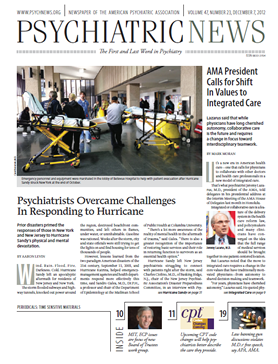Two psychiatrists at Cardiff University in Wales, Michael O’Donovan, M.D., Ph.D., deputy director of the Medical Research Council Centre for Neuropsychiatric Genetics and Genomics, and Michael Owen, M.D., Ph.D., founder and director of the center, have received the 2012 Lieber Prize for Outstanding Achievement in Schizophrenia Research.
The prize was bestowed by the Brain and Behavior Research Foundation (BBRF), which for many years was known as NARSAD, at its annual national awards dinner in New York City October 26.
O’Donovan and Owen have shared a lab for 20 years. They identified some of the first genes that have been robustly implicated in schizophrenia, such as NRXN1, DLG2, and ZNF804a. They have found that some of those genes share certain basic functions in brain cells and also seem to be implicated in other psychiatric illnesses.
Both men discussed not only their particular findings, but the broader subject of schizophrenia genetics at the BBRF’s 24th Mental Health Research Symposium.
Strong Genetic Influence
Scientists know that schizophrenia has a strong genetic influence, O’Donovan stated. If one identical twin has schizophrenia, then the chances are between 40 percent and 50 percent that the other one does as well. But most people with schizophrenia have multiple risk factors, both genetic and environmental.
Over the last decade, he said, identifying schizophrenia genes started to get easier, thanks to new techniques and large samples of subjects. For example, a rare deletion on chromosome 22 has been linked with schizophrenia, which can increase a person’s risk that he or she will have schizophrenia 10-fold. A number of common gene variants have also been found to contribute to the illness, but they are not as potent as rare deletions. Thus “we have shown that we have a route to success,” he said. “But the job is by no means done.” Such findings will be of value to people only if they can be taken out of the lab and used for diagnosis and treatment, he emphasized.
“We have some robust findings at last,” Owen declared. “We know that our techniques work…. I think what we have discovered to date has profound implications for schizophrenia.”
For example, that schizophrenia and bipolar disorder share certain genes was not surprising, Owen said, because schizoaffective disorder lies in a spectrum between schizophrenia and bipolar disorder. But what did surprise him, he said, was that schizophrenia shares certain risk genes with autism, intellectual disability, and attention-deficit/hyperactivity disorder. Moreover, these illnesses share some intrauterine and perinatal risk factors, and there is a lot of comorbidity among these disorders, suggesting common origins.
Because of this knowledge, he predicted, “I think in the future we will have a more complicated or multilevel approach to diagnosis” of mental disorders than currently exists.
There also seem to be links between some of the schizophrenia genes identified and certain nerve-synapse proteins, Owen noted. “So the genetic findings point to synaptic mechanisms,” he said. He envisions that the synaptic mechanisms may someday offer targets for new types of schizophrenia drugs.
Interplay Between Genes, Cognition
A third Cardiff University psychiatrist and a 2009 NARSAD Young Investigator grantee, James Walters, M.D., Ph.D., discussed the interplay between schizophrenia genes and schizophrenia cognitive impairment at the BBRF symposium. Walters is a clinical senior lecturer at the Medical Research Council Centre for Neuropsychiatric Genetics and Genomics and has worked with O’Donovan and Owen for more than five years.
Early cognitive problems are a risk factor for schizophrenia, but not for bipolar disorder, he reported. In other words, individuals who will develop schizophrenia already show IQ deficits as early as age 3 or 4. However, individuals who have schizoaffective disorder generally lie between those with schizophrenia and bipolar disorder when cognitive impairment is assessed.
Schizophrenia gene research and schizophrenia cognitive impairment research are starting to come together, Walters said. For example, a variant of a gene located in the major histocompatibility complex cluster of genes on chromosome 6 has been linked not just with schizophrenia, but with deficits in episodic memory and a smaller hippocampus—the seat of memory in the brain. He hopes that such findings will eventually lead to treatments for memory deficits, concentration problems, and other cognitive deficits that are largely unaffected by current psychotropic medications.
In his own research, Walters has assembled one of the largest genetic samples of people with schizophrenia in the world, all of whom are treatment resistant and are being treated with the antipsychotic drug clozapine. He hopes to identify genes associated with treatment-resistant schizophrenia.

